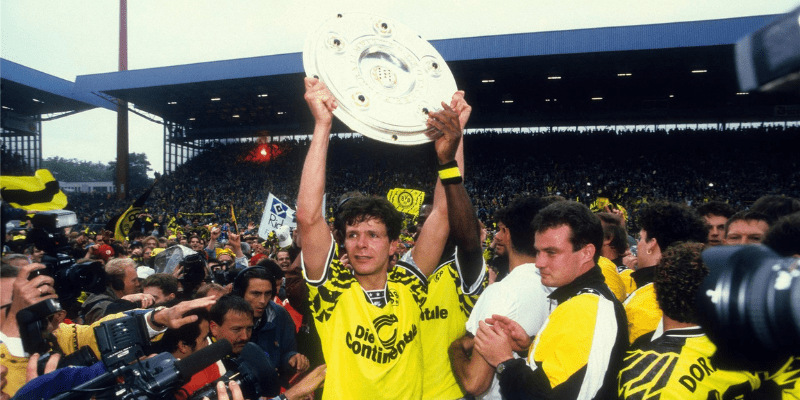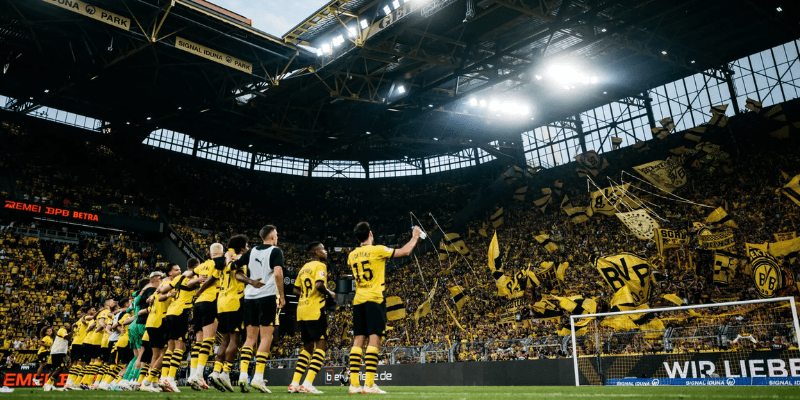From its humble beginnings to becoming one of Europe’s most celebrated clubs, the story of Borussia Dortmund is steeped in passion, ambition, and a fierce identity. So, when was Borussia Dortmund founded? The answer is: Borussia Dortmund was officially established on 19 December 1909.
In this article, SanaaGoal will take you through the origins of BVB, the context behind its foundation, how it evolved over the decades, and why that founding date still resonates with fans today.
Origins and early vision

In the late 19th and early 20th centuries, football was rapidly growing in Germany. Many local clubs were formed under the umbrella of gymnastics associations, youth groups, or even church organizations. In Dortmund, a group of young men felt constrained by the strict oversight and restrictions imposed by a church-associated team. Frustrated by limitations on their independence, they decided to create their own club centered purely on football.
Thus, on 19 December 1909, eighteen founding members gathered in Dortmund and formally founded Ballspielverein Borussia 09 e. V. Dortmund. The name “Borussia” is derived from the Latin name for Prussia and was also inspired by a nearby Borussia brewery — a common naming pattern among German clubs at the time. The “09” references the founding year, 1909.
Originally, the new club played in blue-and-white striped kits with a red sash, but by 1913 they adopted the now-iconic black and yellow colors that fans all over the world recognize today.
First steps: early matches and league entry
After the initial founding, it took some time before BVB played its first official match. In fact, over 392 days passed before the club could take the field in an organized capacity. Their first recorded match was held on 15 January 1911, when Borussia Dortmund beat VfB Dortmund 9-3. The club was admitted to the regional Westdeutschen Spielverband soon afterward and began competing in the lower tiers of German football.
In those early years, Dortmund often juggled between amateur and semi-professional status, experiencing both growth spurts and financial struggles. One near-catastrophic moment came in 1929, when an ambitious but risky attempt to sign paid players left the club in serious debt. Thanks to the intervention of a loyal local supporter, BVB survived and continued onward.
Growth, challenges, and identity

Over the next decades, Borussia Dortmund faced various ups and downs. During the 1930s and 1940s, German football was reorganized under the Third Reich, and many clubs were subject to political oversight and restructuring. Borussia’s leadership even faced pressure, known as the Revierderby, remains one of German football’s fiercest.
During the 1950s, Dortmund began to taste success: they won their first national championship in 1956, followed by another in 1957. These triumphs signaled that what had begun as a grassroots club was increasingly commanding respect on the national stage.
From Bundesliga era to European triumphs
When the Bundesliga was founded in 1963 as Germany’s new top-flight, Dortmund was among the original 16 clubs to compete. The club made an immediate mark: in 1965, they lifted the DFB-Pokal, and in 1966 they secured continental glory by winning the European Cup Winners’ Cup, beating Liverpool in extra time.
However, the road was not always smooth. BVB endured relegation to the second division in 1972, and struggled financially through the 1970s and 1980s. But these hardships set the stage for a renaissance. In the 1990s and 2000s, under managers such as Ottmar Hitzfeld, Dortmund reclaimed domestic titles and even clinched the UEFA Champions League in 1997.
In recent years, Borussia Dortmund has evolved into a modern powerhouse, renowned not only for success on the pitch but also for cultivating young talent (think: Reus, Götze, Haaland, Sancho) and fostering one of the most passionate fan cultures in world football — centered around the Yellow Wall, the massive standing terrace in their Signal Iduna Park stadium.
Why the founding date still matters today

The date 19 December 1909 is not merely a historical footnote — it’s a core part of BVB’s identity. Every anniversary, fans reflect on how far the club has come since those 18 founders met in Dortmund. It’s a reminder of the rebellious spirit, of independence, and of grassroots passion.
In modern times, Borussia Dortmund remains committed to fan involvement, maintaining community roots even while competing at the highest European levels. Whether in acknowledging founding members, preserving club traditions, or engaging fan culture, the founding date anchors Dortmund’s narrative amid the fast-paced world of modern football.
Final Thoughts
When was Borussia Dortmund founded? On 19 December 1909. That date marks the birth of a club that would rise. From playing matches in a modest “Weiße Wiese” field to roaring beneath the Yellow Wall in Europe’s elite competitions, BVB’s journey is a tribute to perseverance, identity, and the enduring power of football.
Below, SanaaGoal encourages you to dive deeper: explore Borussia Dortmund’s trophy history, iconic players, transfer stories, and match analyses here on our site. Bookmark this page, share with fellow fans, and return anytime you want to relive the story of Dortmund —






